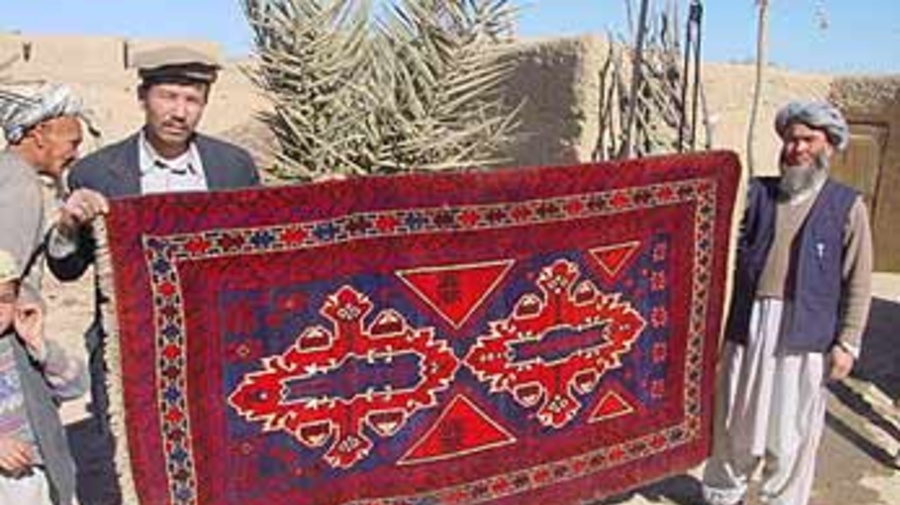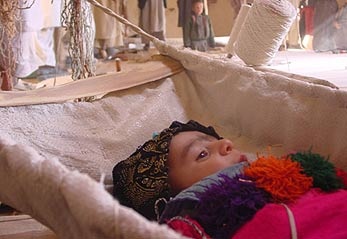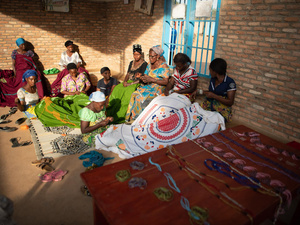Feature: Eager weavers put a positive spin on refugee life in Pakistan
Feature: Eager weavers put a positive spin on refugee life in Pakistan

Afghan refugee Haji Juma (right) displaying his hand-made carpet in Katwai camp, Balochistan.
LORALAI, Pakistan (UNHCR) - In the Katwai refugee camp in Pakistan's arid Balochistan province, the carpet-weaving skills that the Afghans brought when they fled their homeland two decades ago continue to sustain them until the day they decide to return to Afghanistan.
"After our arrival in Pakistan, we started carpet weaving in the camp," says Haji Juma, a Turkmen elder who moved with his family from Jawzjan province in northern Afghanistan in 1982 following the Soviet invasion. "Initially it was a hard task to establish the set-up in our camp houses, but somehow we did it."
Now there are around 400 families involved in carpet weaving in Katwai, an Afghan refugee camp established by the UN refugee agency in the village of Loralai, some 275 km north-east of the Balochistan capital, Quetta.
"The carpets that we make have great value in Pakistan and abroad. There is a contractor in Lahore and one in Karachi who come with the orders for the carpets that we have to make. Our carpets are sent to America, Germany, Australia and Turkey," explains Juma.
According to him, every home in the camp is involved in carpet making in some way. There are small units for spinning and dyeing wool. "It's actually a combined family effort; women are a great help along with men in making hand-made carpets."
The skills have sustained them in very difficult conditions. "This is a great help for our families," says Palwasha Bibi, a woman who, in addition to household chores, makes time for carpet weaving. "Whether we like it or not, we have to do it. It helps us earn money to run our homes. Men and women both have to work to sustain a livelihood."
Although the skill arrived from Afghanistan with the ethnic Turkmen, who have been famous for the craft for centuries, at Kitwai the 50 ethnic Uzbek families from Afghanistan who share the camp have turned to the same source of income.
"The Uzbeks are our brothers and we passed the skill to them," said Juma. "Now they are also involved in weaving carpets, earning a handsome monthly income."
This opportunity to earn vital income does not come without health hazards. In every compound, a separate room is reserved for weaving. The doors and windows are covered with plastic sheets, blocking out fresh air.
As they weave, mothers keep their infants beside them in home-made swings. Some babies have skin rashes that look like allergies to the wool being used for the carpets. "Our children are not comfortable, but we don't have anyone else to take care of these little ones," explains one of the women.
The refugees also face problems with Pakistani authorities when trying to send their carpets to customers. "Being Afghan refugees, we face a lot of problems after weaving the carpets and sending them for sale in other cities of Pakistan," says Juma.
"Whenever we complete an order and try to send it from Loralai to other cities, the local authorities stop our carpets and accuse us of smuggling them from Afghanistan or Iran. They are often not ready to accept that we are weaving the carpets ourselves," complains Juma.
The refugees have tried to solve the problem by using the only official Pakistani recognition of the refugees' carpet industry at Loralai - a licence issued to one refugee home. "The authorities have issued a licence to one Afghan living in the camp, so we make photocopies of the licence and then try to send our consignments using this licence. But making one copy in Loralai costs us 500 rupees (about $9)."
According to Juma, most of their carpets now are sent to Europe, with the production shifting to meet tastes there. "The demand for dark-coloured carpets has faded away these days. The contractors ask for light-coloured carpets which they are sending to Europe," he says.
Every week the families under Juma's supervision weave around 25-30 square metres of carpets. For a long time, a square metre of hand-made carpet had a cash value of around 2,000 rupees, equivalent to $35. That price was also the monthly wage of one carpet weaver.

A baby sleeps as the grownups weave their carpets. A downside is that some babies have developed allergies to the wool used in carpets.
During 2002, many carpet-weaving families returned to Afghanistan from Pakistan's North West Frontier province, where the provincial capital Peshawar had become a major centre of carpet production. That proved beneficial for the refugees who remained.
"The quantity of orders that were coming to us rose almost 100 percent. The average monthly wage also went up from 2,000 rupees to 4,000 rupees for a person involved in carpet making," says Juma.
Juma has doubts about returning to his homeland soon: "Of course we would like to go back to Afghanistan, but prospects of a return right now or in few months' time are a bit grim."
He says he will return once complete normalcy is resumed in Afghanistan. Around 20 families went home to Jawzjan from the camp last summer, but Juma says reports now coming back from them are not very positive.
In the meantime, the refugees want to ease into life in Pakistan, offering even to pass on their carpet-weaving skills to the local Pakistani population in Balochistan.
"We are ready to do that. All that we ask from the Pakistani government, local authorities and the United Nations is to make local authorities understand that we are working on our own. They should respect our skills by considering the carpets as our own products - not something that we keep smuggling from Afghanistan," says Juma.
"Yes, we did bring the skill," he adds. "But all the weaving, all the hard work, is being done in Pakistan. And we have been involved in this for the last 20 years."
By Babar Baloch
UNHCR Pakistan









